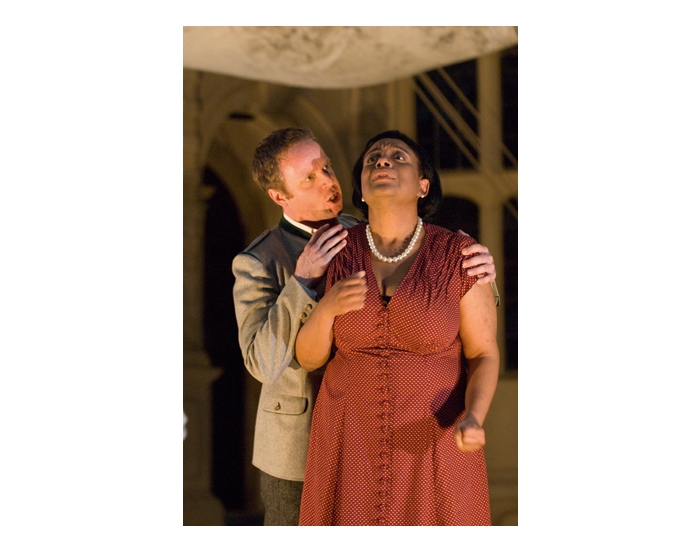Opera Holland Park has as its speciality little-known Italian operas from the last decade of the 19th century and the first decade of the 20th. It’s a period that seems to have been swarming with composers who were eager, somehow, to combine the ardours of Verdi with the larger symphonic constructions that were being created across the Alps.
OHP has turned up some worthwhile specimens, of which last year’s Francesca da Rimini by Zandonai was one of the classiest. This year is La Wally by Catalani, of which everyone knew, or still does, the hit number ‘ebben?…N’andro lontana’ thanks to the movie Diva. Alas, that turns out not only to be the best thing in the score, but also to have been composed, as a song, 15 years earlier. Catalani was a passionate Wagnerian, and does his best to organise this opera on a large scale, but though the orchestration is arresting, the melodies or musical motifs aren’t, or not enough for you to feel that the whole thing is a cumulative structure. The interludes which precede Acts III and IV are especially weak. Nor is Catalani impressive in the music of action — indeed very few composers are — and here a lot is called for, since this piece is set in the Tyrolean Alps and the characters are vigorous, striding out to or among them at the drop of an insult.
The heroine, Wally of the title, is an odd creation, a tomboy into outdoor exploits, but also very passionate and choosy about men. Catalani clearly didn’t want to do the slice-of-life stuff that was all the rage, but he didn’t manage to create a plausible alternative to it. His heroine is less heroic than foolhardy. And unfortunately OHP didn’t have a singer to rise to the limited opportunities that are offered. Gweneth-Ann Jeffers has given me a lot of pleasure in several operas, but here she seemed to be unsure of her character’s identity — something one can sympathise with — and her voice was sometimes unsteady, too.
The two rivals for her hand were more strongly cast, with Adrian Dwyer as her true love with whom she is eventually united in a fatal avalanche, and Stephen Gadd as the one who doesn’t interest her. The opera needs vigorous, propulsive conducting, and didn’t really get it from Peter Robinson. OHP should have another shot at La Wally, though in his authoritative book The Autumn of Italian Opera Alan Mallach writes: ‘The music of La Wally is consistently good, but rarely more than good,’ and quotes the stern judgment of Catalani’s biographer Zurletti: ‘La Wally is Catalani’s masterpiece but it is not a masterpiece.’ There aren’t all that many operatic masterpieces anyway, so interesting second-rank works need to be investigated.
I just caught up with OperaUpClose’s production, by their founder, Adam Spreadbury-Maher, of Britten’s The Turn of the Screw. Since this is a chamber opera, you might think it was a good candidate for performances on a shoestring in the back of a pub. But Britten’s orchestration is so brilliant, perhaps above all in Screw, that it is already stripped to essentials, and to have nothing but a solo piano turned out, not surprisingly, to be fatal. An enormous proportion of Screw’s success is due to weird and disturbing instrumental colouring, above all from the woodwind, which the piano is powerless to duplicate or even to suggest. No other opera that OperaUpClose has done has suffered so irremediably from this treatment.
That aside, the standard of performance among the singers is quite remarkably high, though, as always with this company, I can’t understand why someone doesn’t tell them to be quieter. One of the creepy things about Screw, after all, and especially in a production where the audience and actors are within touching distance, is that it is so intimate. When, for much of the time, the singers are bellowing at one another, that gives the impression that they are all raving. In the case of the housekeeper Mrs Grose, that may be intentional. Normally she is played as a placid old thing, but here she is little older than the Governess, to whom she takes an instant fancy.
In fact, in this production, instead of the usual question, is there any illicit fancying going on?, we are faced with the question, is there any illicit fancying not going on? Katie Bird’s Governess, strongly performed, can’t keep her hands off Miles. Saul Friend, whom I saw in that part, is unnervingly self-possessed, but sings in an irritatingly piping voice, contributing more than his fair share to the general verbal unintelligibility. The ghosts are impressive, and just in case one should doubt that the ceremony of innocence is drowned, they get down to a hard sex session on the chair, almost the only prop, and one which obsesses most of the characters. An odd evening, which I think many people would be very taken by.






Comments